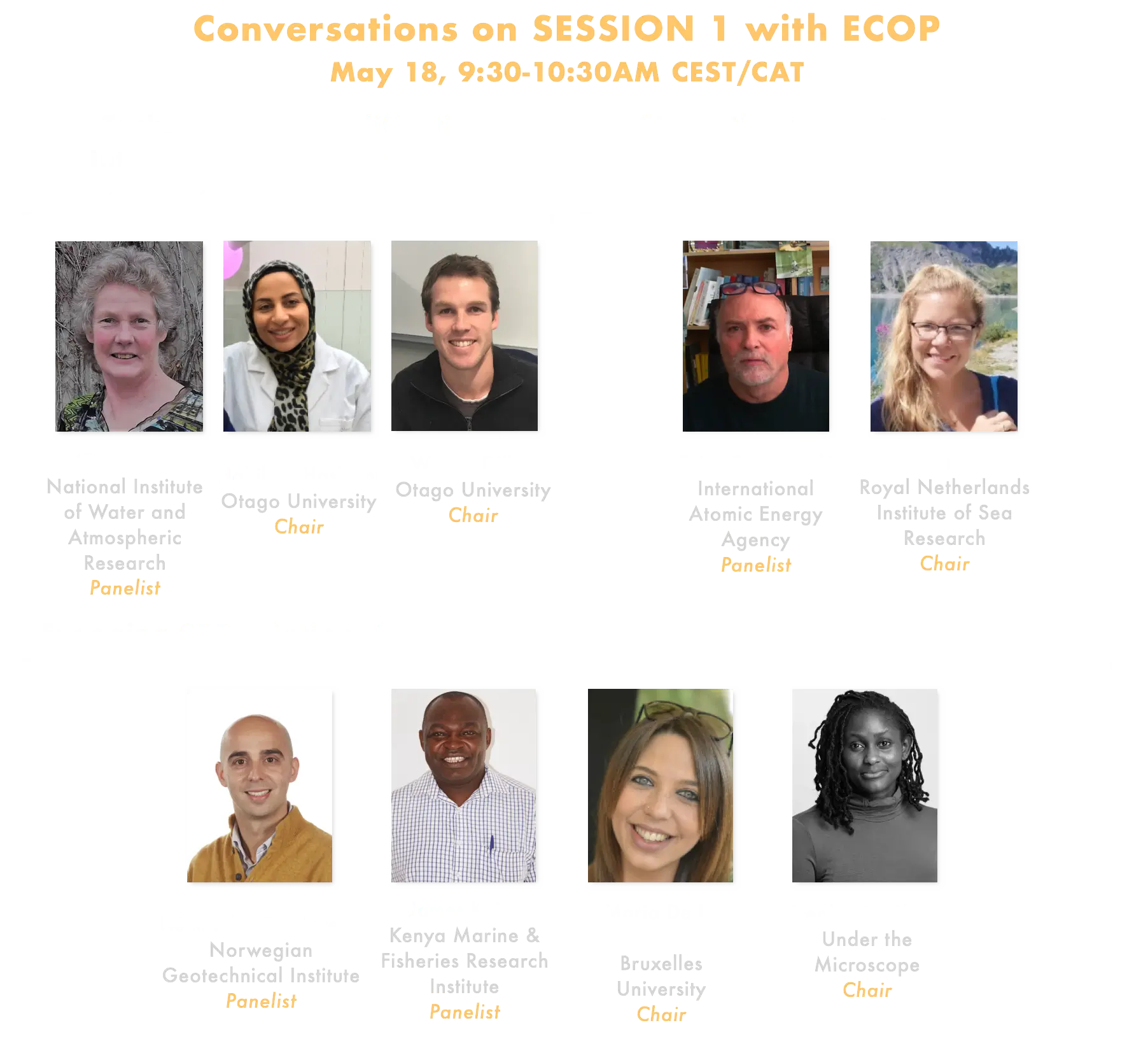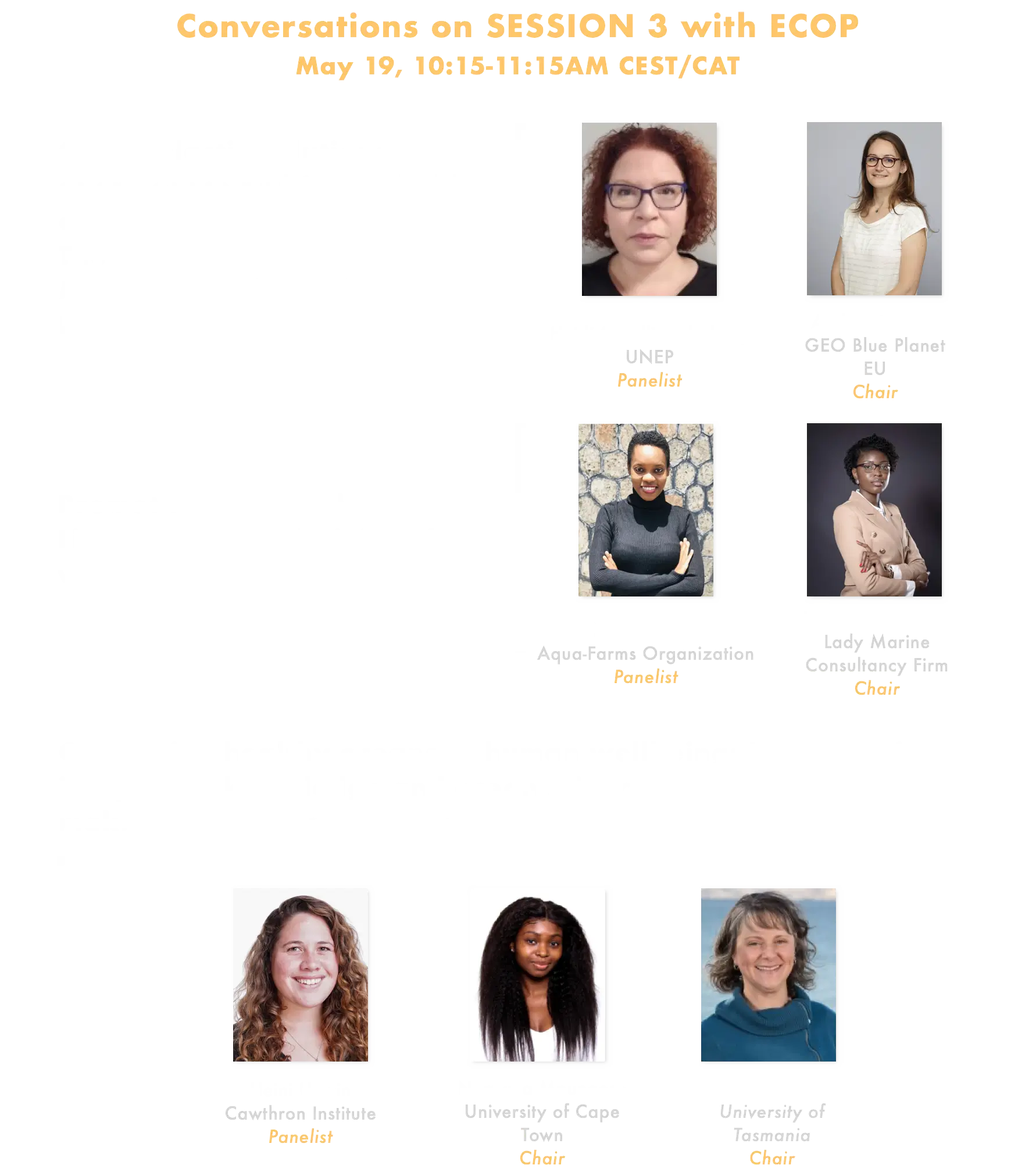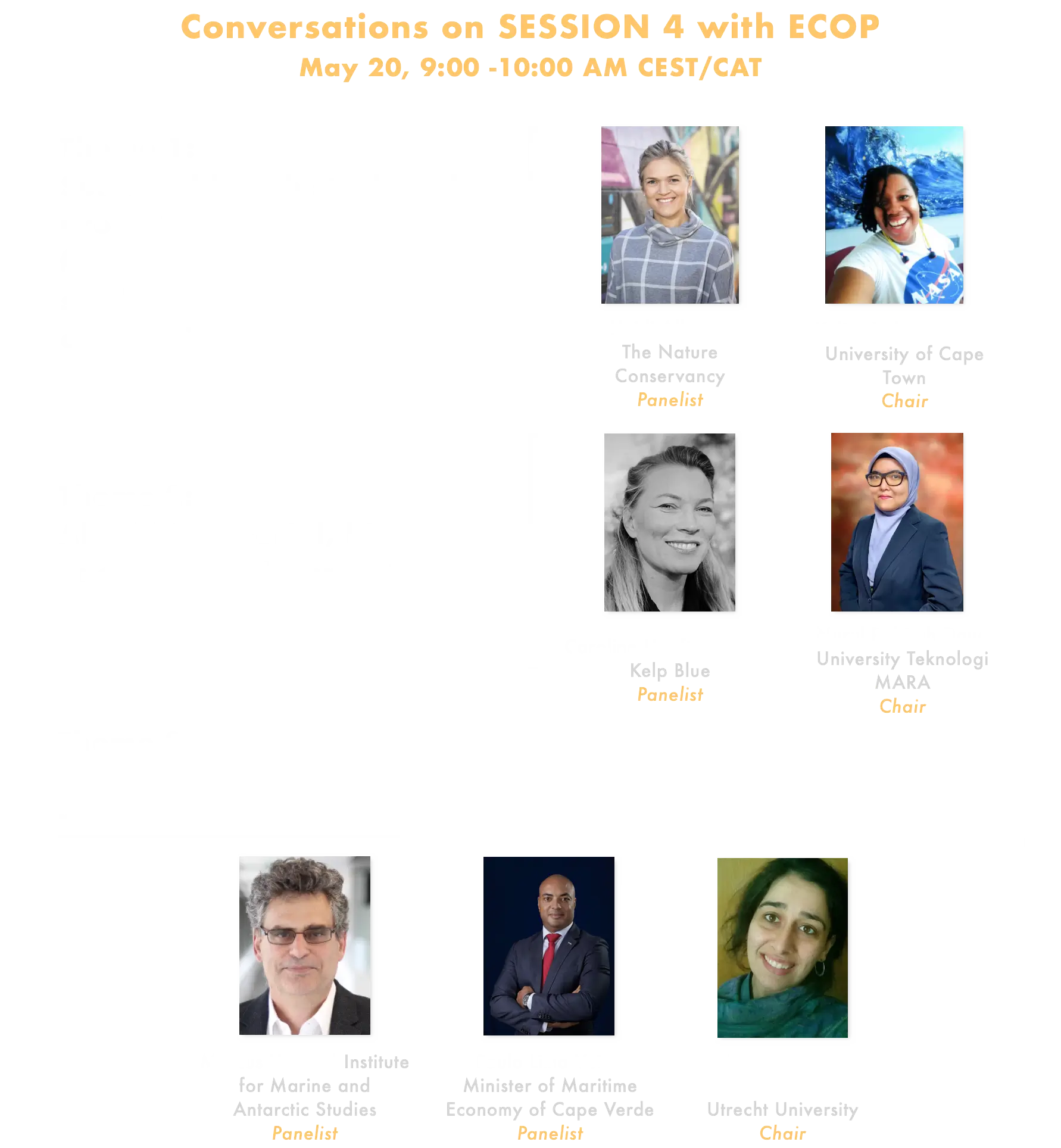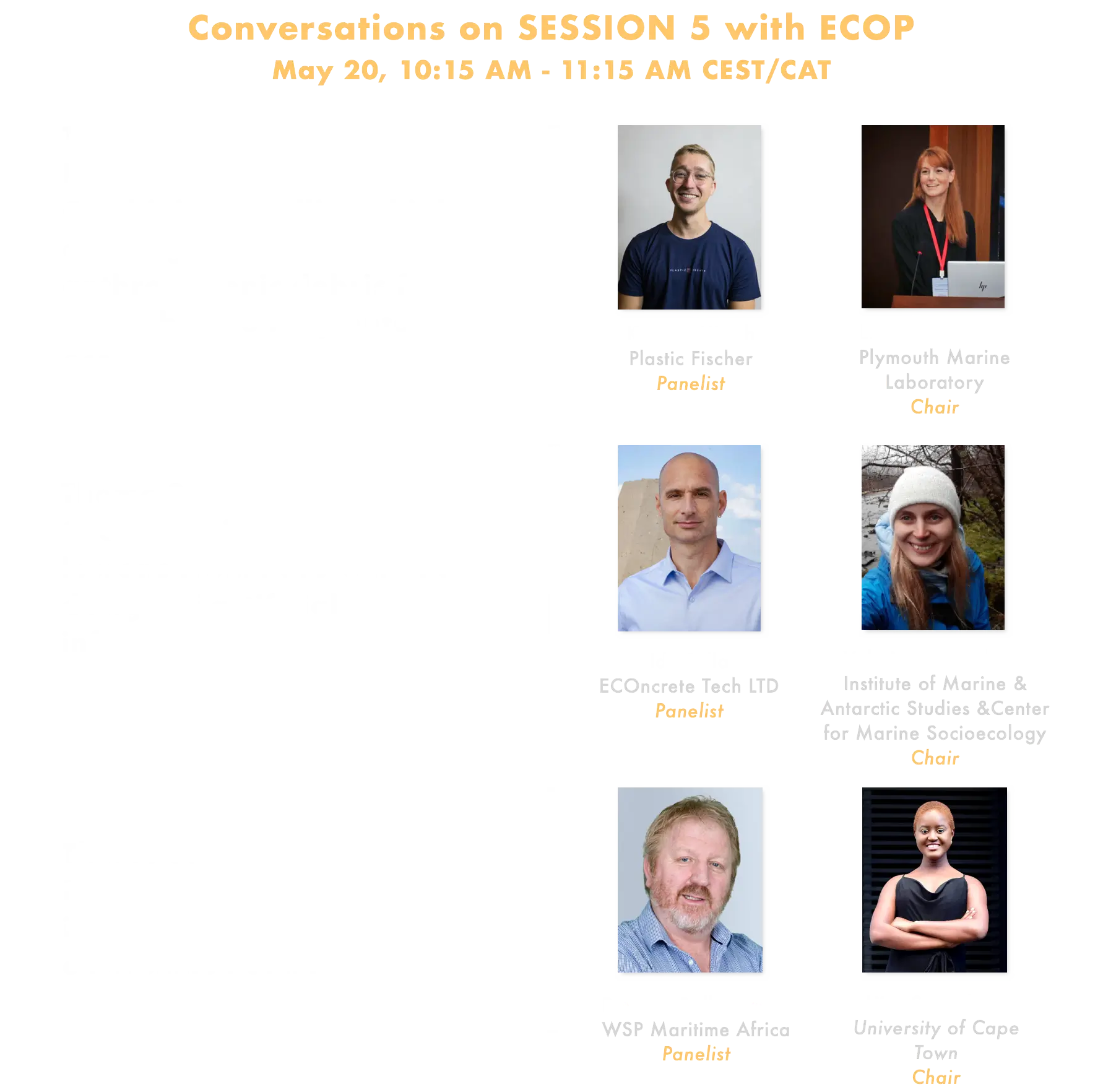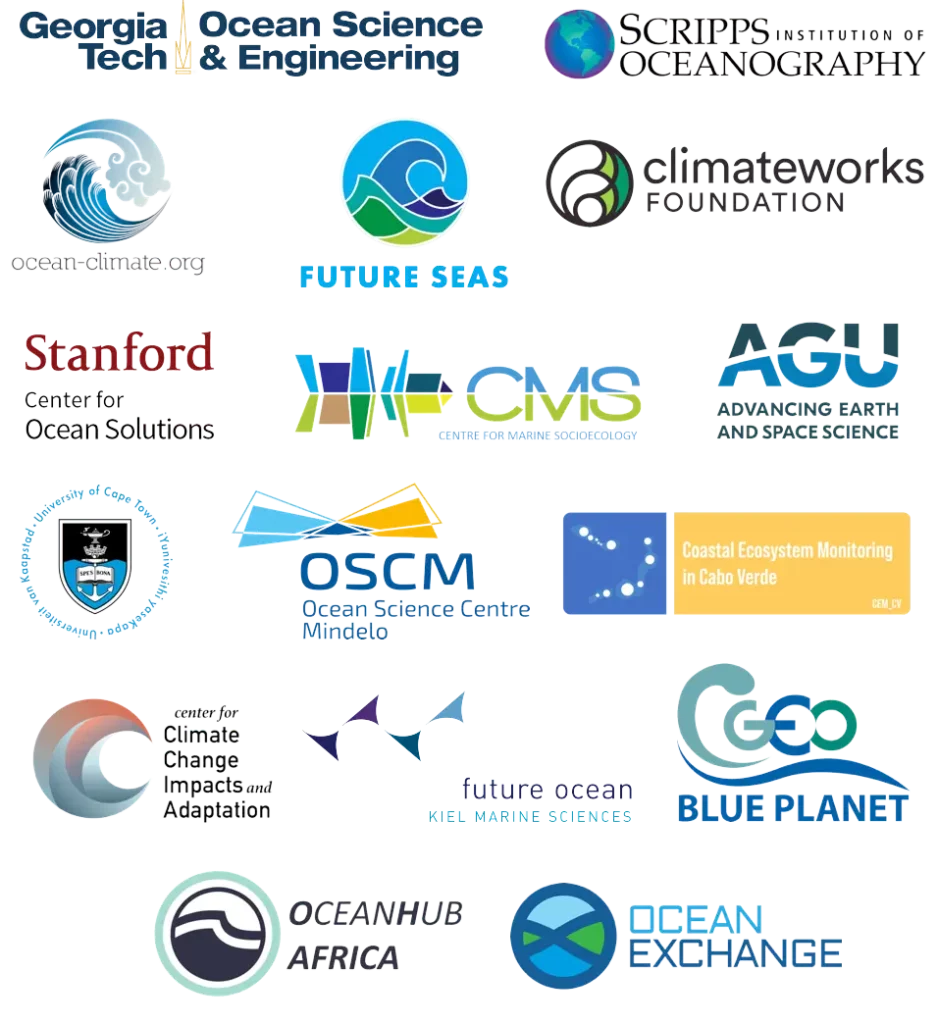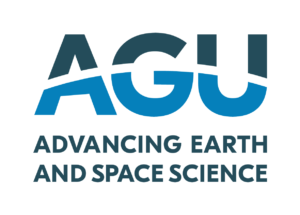
Virtual Summit Portal
A special thanks to the American Geophysical Union (AGU) for partnering with Ocean Visions and for kindly hosting the summit on its virtual platform. You can still browse the interactive portal (button above).
The Ocean Visions 2021 Summit May 18-21, 2021 “Towards a Global Ecosystem for Ocean Solutions” will bring together a multi-sector community of researchers, innovators, decision-makers, funders, and more to develop roadmaps for solving great ocean challenges including ocean-based solutions to climate, equitable coastal solutions strategies for resilience and adaptation, marine circular economies, ocean & human health, and how to transform research from academia into sustainable businesses.
The Summit is held virtually on the campus of the Scripps Institution of Oceanography, USA, on May 18-21, 2021. The summit is linked and co-organized with satellite virtual campuses in Hobart, Australia, Cape Town, South Africa, Mindelo, Cabo Verde, and Kiel, Germany.

A special thanks to the American Geophysical Union (AGU) for partnering with Ocean Visions and for kindly hosting the summit on its virtual platform. You can still browse the interactive portal (button above).
May 18, 7:00 AM – 7:30AM PD
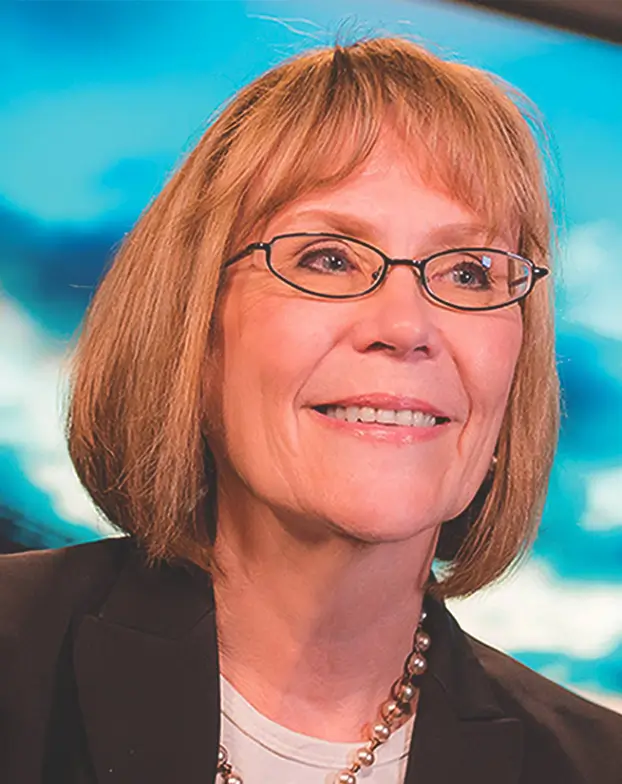
Director Scripps Institution of Oceanography
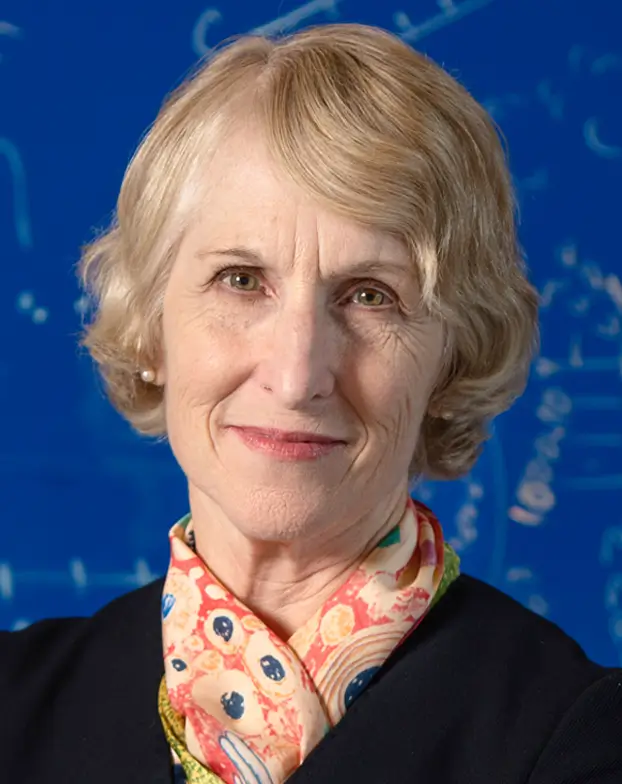
Dean, College of Sciences, Georgia Tech President of AGU
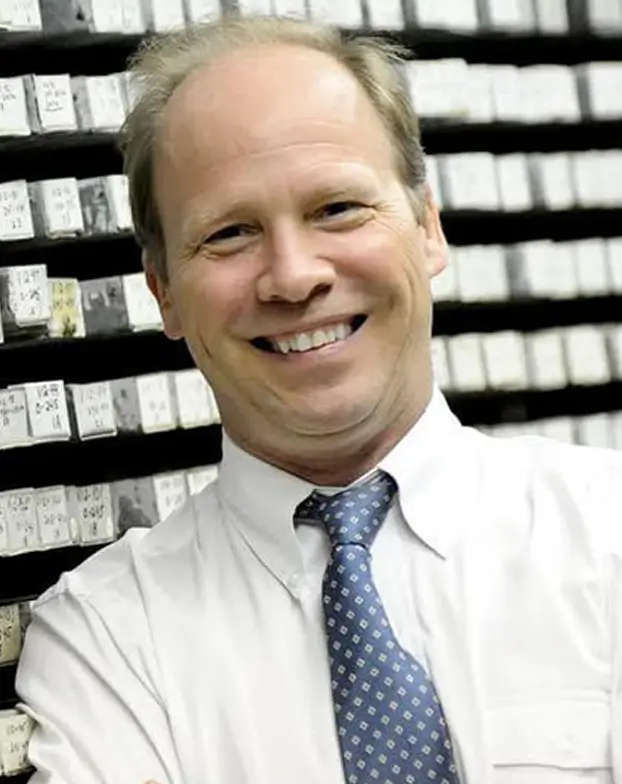
President & Director Woods Hole Oceanographic Institution
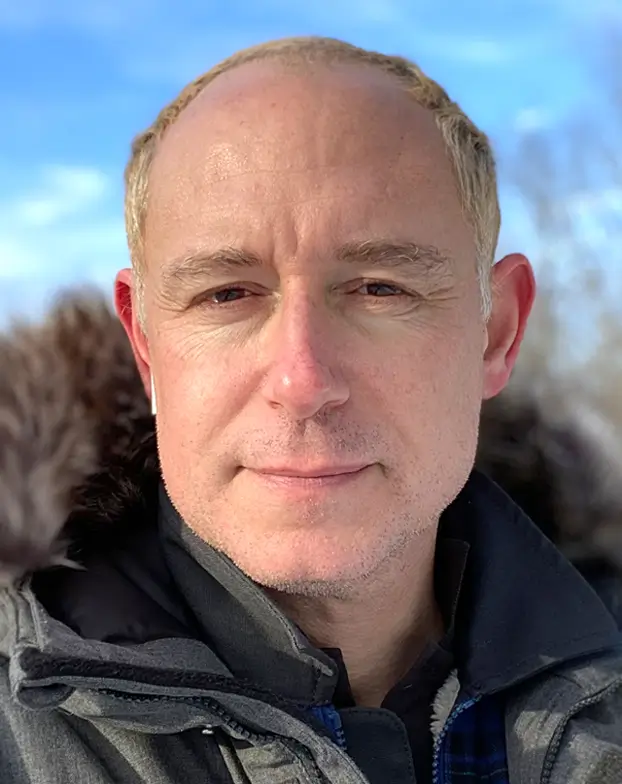
Chairman Ocean Visions Director, Ocean Science & Engineering, Georgia Tech
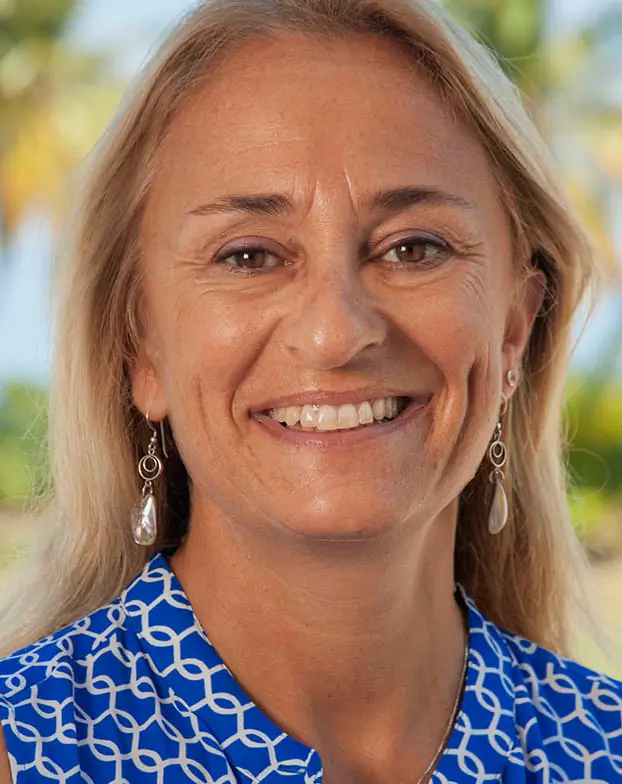
Co-Director, Stanford Center for Ocean Solutions
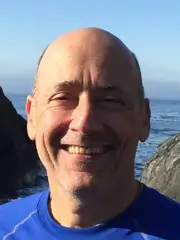
Executive Director & Chief Innovation Officer Ocean Visions Inc
May 18, 9:00 AM – 9:30 CEST/CAT (Icebreaker)
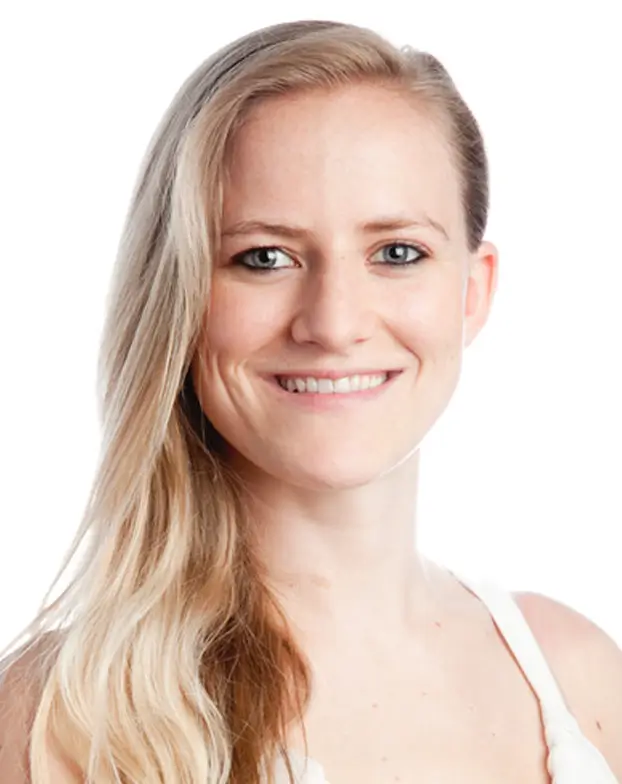
Europe Host Co-Organizer Ocean Visions Summit Postgraduate Researcher Utrecht University
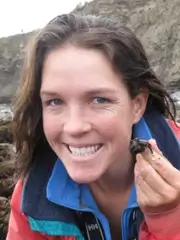
Co-Founder, ECOP CalCOFI Coordinator Scripps Institution of Oceanography
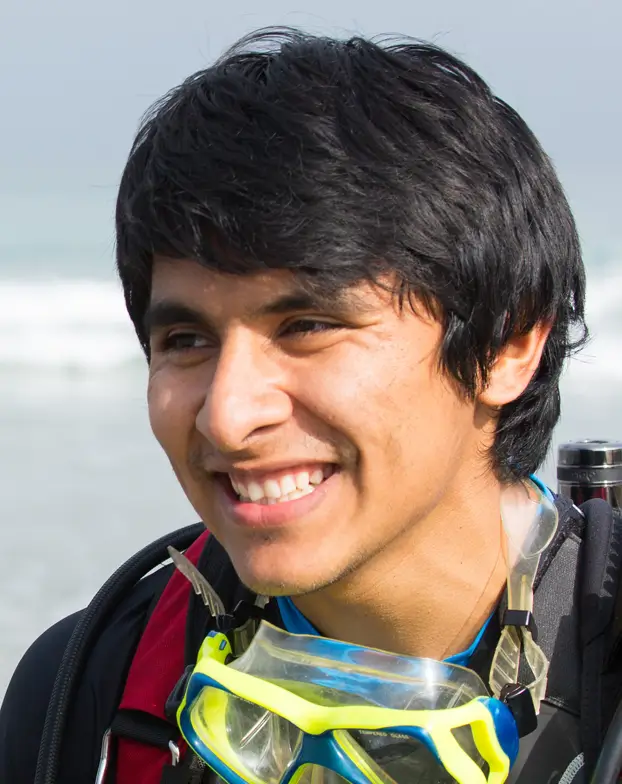
USA Host André Hoffmann Fellow, Stanford Center for Ocean Solutions & World Economic Forum
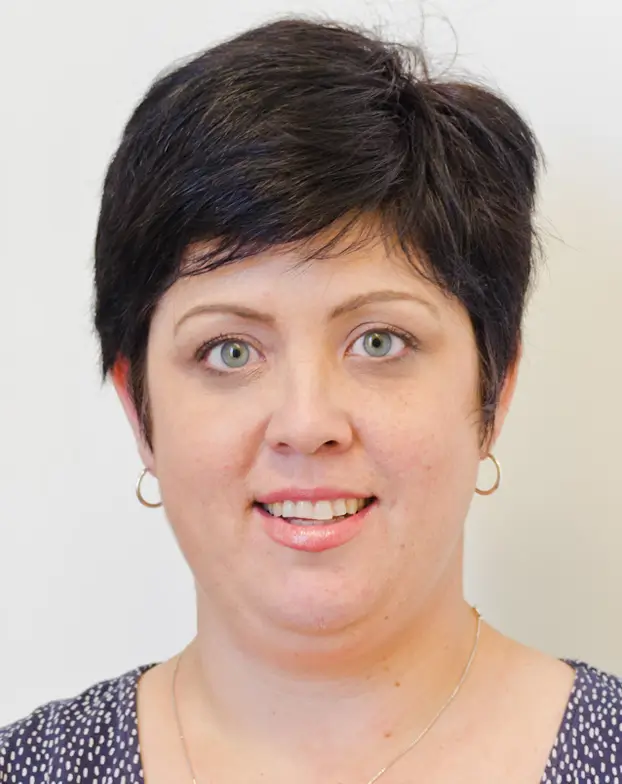
Africa Host Research Fellow, University of Cape Town, South Africa
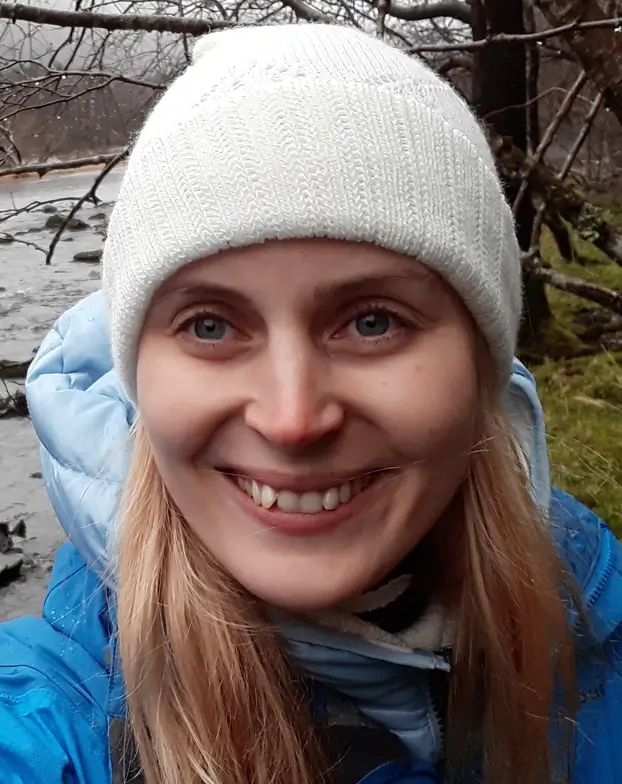
Australia Host Associate Lecturer University of Tasmania
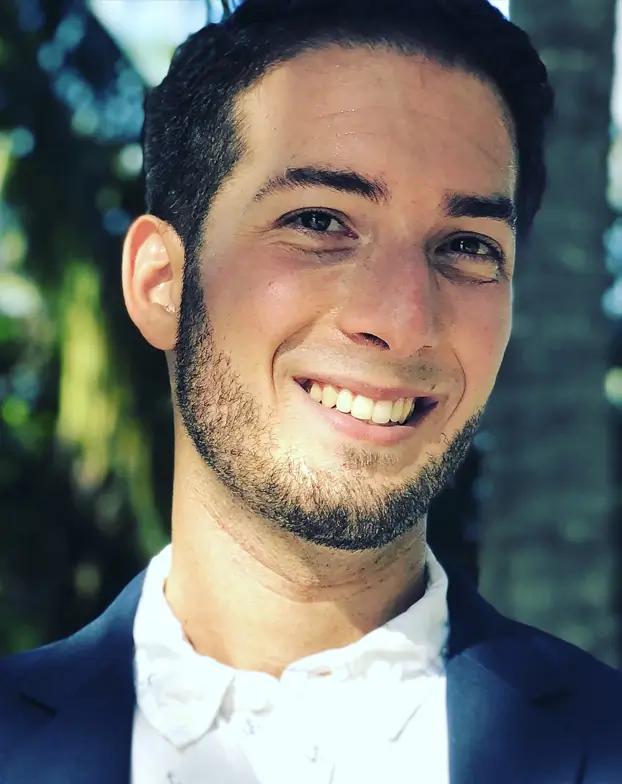
USA Host CEO & Founder Seaworthy Collective
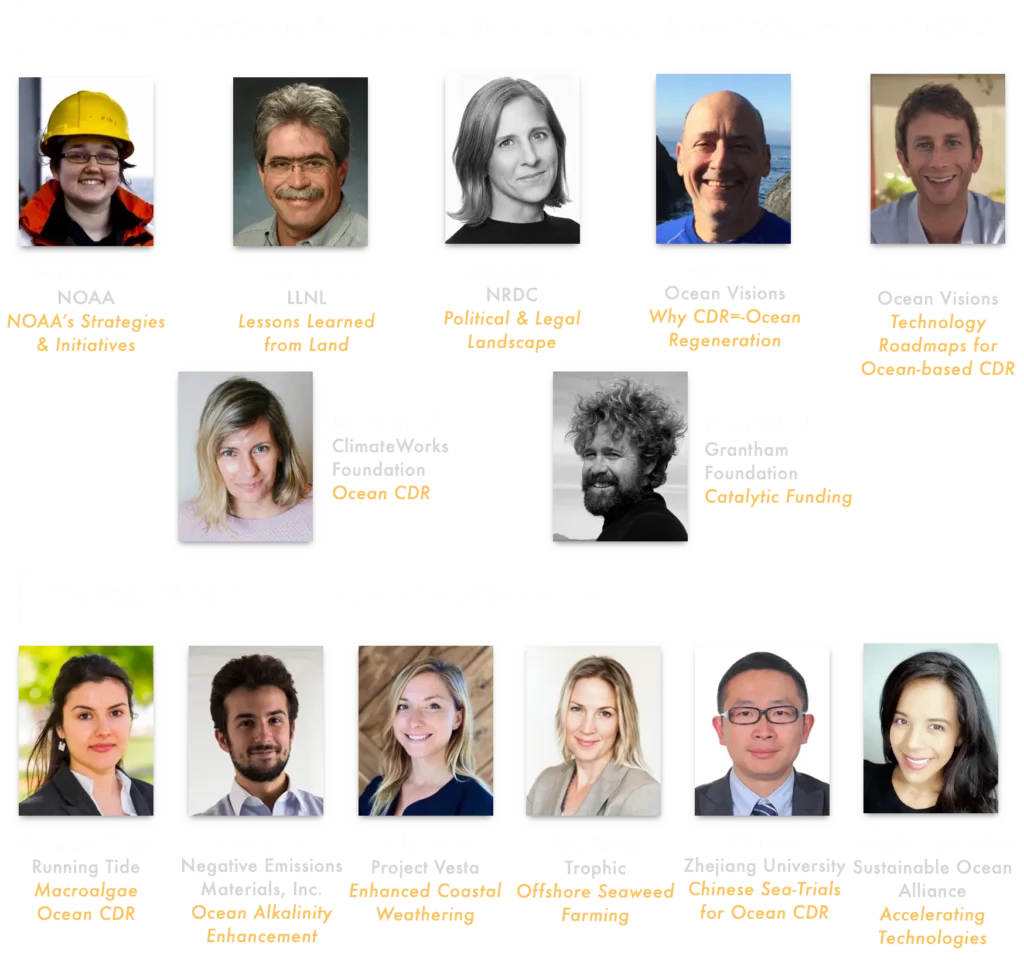
Co-chairs: David Koweek (Ocean Visions, Inc. & Stanford COS), Brad Ack (Ocean Visions, Inc.), Lydia Kapsenberg (CEA Consulting)
The Ocean has been, and continues to be, dramatically disrupted by warming and acidification caused by decades of greenhouse gas pollution in our atmosphere. Removing this pollution, carbon dioxide removal (CDR), is becoming increasingly understood as an imperative for slowing, and later reversing, climate change. The Ocean holds enormous potential for CDR solutions at the needed global scale given their sheer size and their biological productivity. Thus, The Ocean may play an important role in helping to solve the climate crisis, instead of merely suffering its effects. In this session, we present results and lessons learned from a year-long Ocean Visions-led process of developing road maps for actionable progress on development, testing, and deployment of ocean-based CDR approaches. These road maps address technological, market, policy, and governance barriers to progress and propose paths forward to accelerate ocean-based CDR approaches. The road maps are intended to catalyze increased attention, engagement and action and lead to increased deployment of needed intellectual, physical, institutional and financial resources throughout the global community.
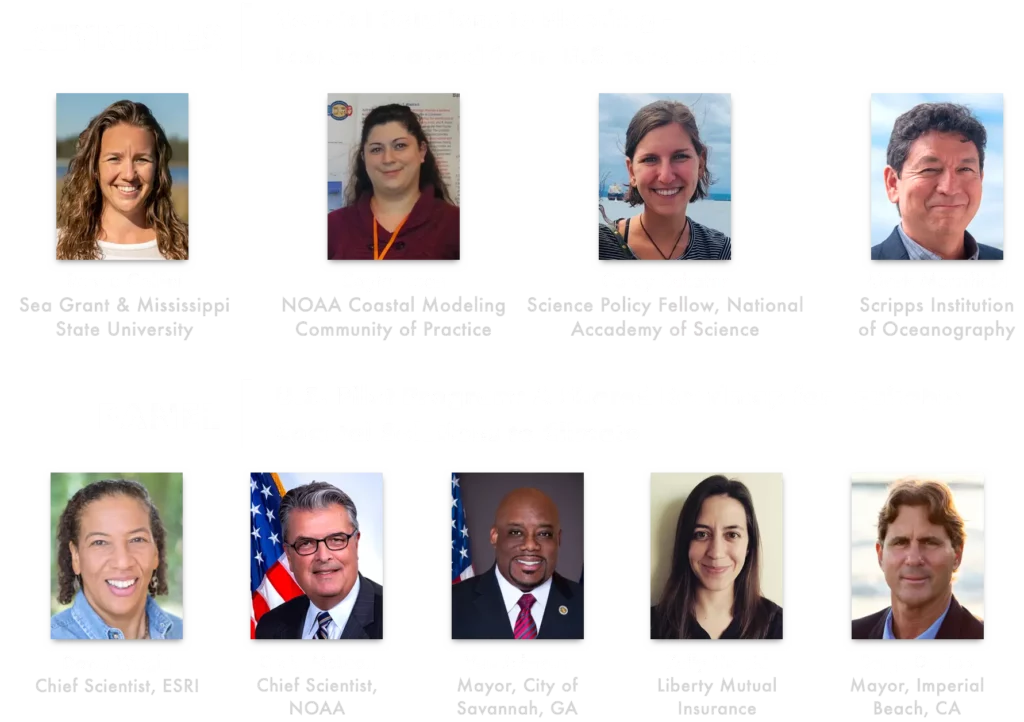
Co-chairs: Emanuele Di Lorenzo (Georgia Tech), Mark Merrifield (Scripps), Renee Collini (Mississippi State University), Laura Engeman (Scripps and Sea Grant), A.R. Siders (University of Delaware), Jill Gambill (University of Georgia, Marine Extension and Georgia Sea Grant), Kim Cobb (Georgia Tech), Nadia Pinardi (University of Bologna & CoastPredict), Gary Mitchum (University of South Florida), Théophile Bongarts (Ocean & Climate Platform)
Session 2a
Coastal flooding, inundations, and sea-level rise threaten infrastructure, economies, ecosystems, communities, and cultures. Adapting to these threats will require a holistic, coordinated, multi-sector approach to identify and implement systems-wide transformative solutions. To this end, national task forces are developing to link experts from numerous fields with one another and with coastal communities to facilitate knowledge exchange, promote cross-sector collaborations that meet local needs, and pursue optimistic visions for adaptation. Building on the Ocean Visions coastal solutions scoping workshop, this session will convene potential United States task force members from a wide range of sectors (e.g., insurance, engineering, social and physical sciences, humanities, journalists) towards establishing a national pilot program to implement a “Shared Roadmap for Equitable Coastal Solutions to Climate”. Coastal community leaders will meet with breakout groups to discuss their most pressing needs, and participants will develop an agenda with priority actions for the task force and a vision for an adaptable coast.
Session 2b
Coastal flooding, inundations, and sea-level rise threaten infrastructure, economies, ecosystems, communities, and cultures. Adapting to these threats will require a holistic, coordinated, multi-sector approach to identify and implement systems-wide transformative solutions. The Sea’ties initiative aims to identify and implement adaptation solutions and responses to climate change, based on scientific synthesis, peer-to-peer learning, and network sharing in five regions (Pacific, North & West Africa, US West Coast, and Europe). It will mainly focus on medium-sized cities and explore solutions and responses tailored to each regional context: hard & soft responses, nature-based solutions, relocation, and spatial recomposition. Based on scientific analysis and with the support of local referents, the project will mobilize a wide range of stakeholders and enable local experiences to be collected, analyzed, and shared. The main objectives are 1) to identify and promote key factors of success to accelerate the implementation of the Paris Agreement, and 2) to create and animate a dynamic network of medium-sized coastal cities.
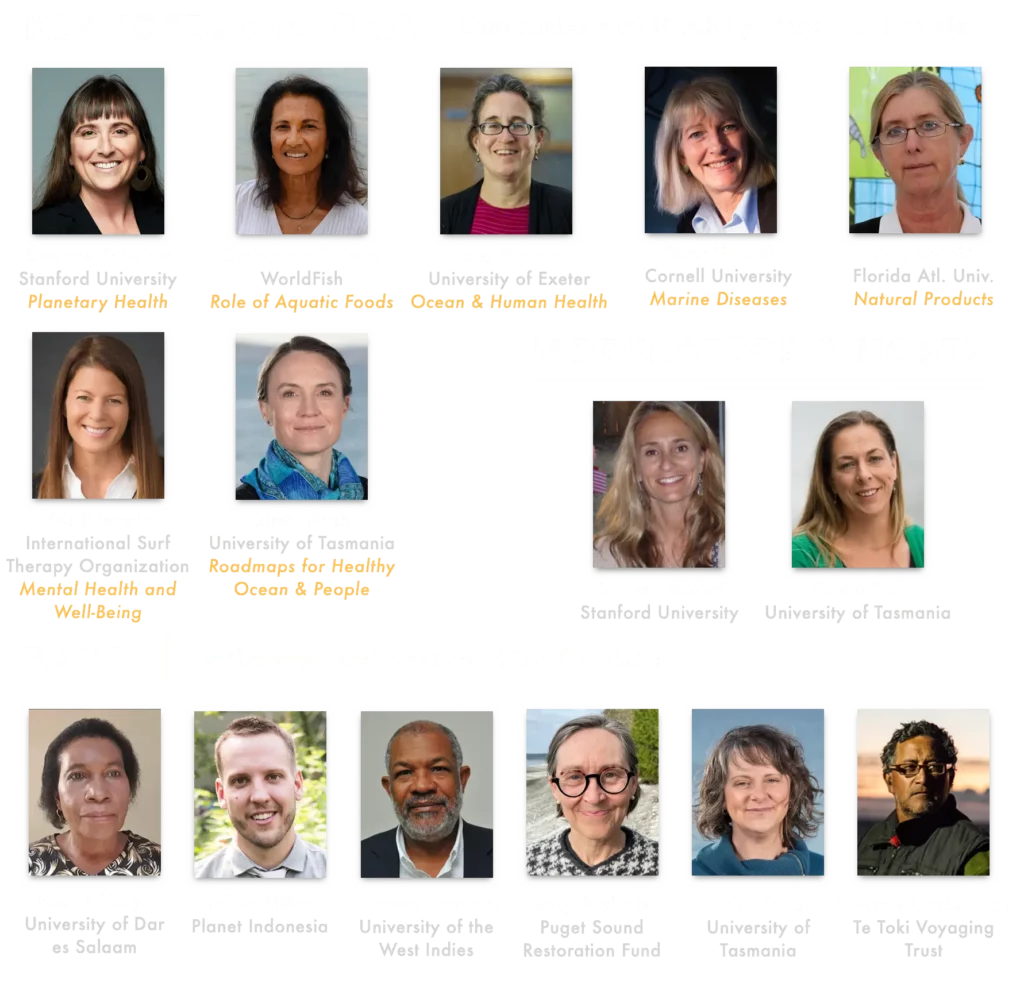
Co-chairs: (3a) Fio Micheli, Michelle Tigchelaar and Collin Closek (COS), Jack Gilbert (Scripps), Anupa Asokan (Surfrider Foundation), Gretta Pecl (Centre for Marine Socioecology, Univ. of Tasmania), Sarah Allard (Department of Pediatrics and Scripps Institution of Oceanography, UCSD), Gertrude Ecklu-Mensah (Health Sciences, UCSD), Manu Prakash (Stanford University), Susanne Sokolow (Stanford University), (3b) Louise Gammage (University of Cape Town), Delphine Lobelle (Utrecht University), Amanda Schadeberg (Wageningen University and Research Center), Nina Rivers (Nelson Mandela Metropolitan University), Marieka Norton (University of Cape Town), Jennifer Beckensteiner (University of Bretagne)
Session 3a
There is broad recognition that oceans bring wealth, through fisheries, aquaculture, minerals, energy, commerce, tourism, and more. They are a global, irreplaceable source of income and livelihood. There is an increasing awareness that oceans are also critical to health and well-being. This session has the goal of identifying opportunities and levers for promoting healthy ocean-healthy people. Through presentations, public participation and input, and small-group sessions we aim to: highlight key links between ocean and human health; showcase innovation in this space; identify pressure points, where action has the greatest potential to deliver solutions.
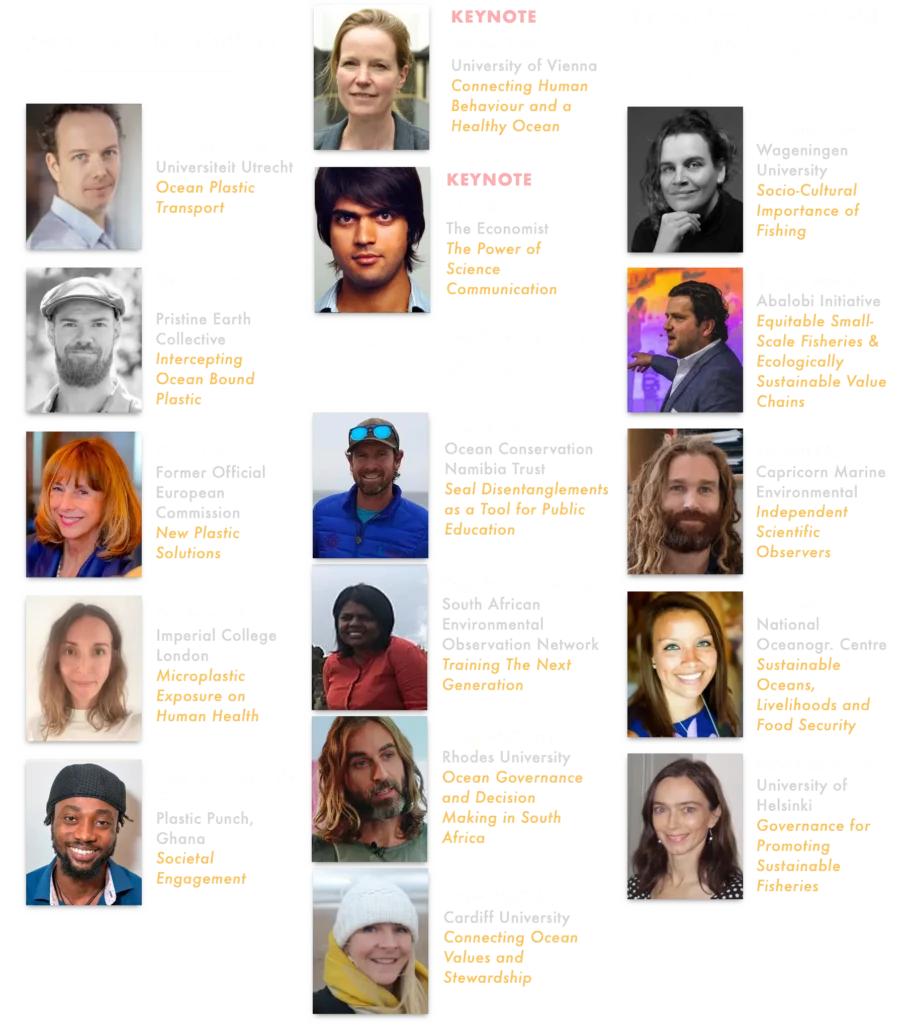
Session 3b
There is broad recognition that oceans bring wealth, through fisheries, aquaculture, minerals, energy, commerce, tourism, and more. They are a global, irreplaceable source of income and livelihood. However, there is an increasing awareness that oceans are also critical to human health and well-being. This session aims to identify opportunities and levers for promoting ‘healthy oceans-healthy people’. Here, we continue the conversation started in the US hub’s Session 3 by taking a closer look at some of the challenges and opportunities related to the intersection of oceans and human health. During three simultaneous breakouts, namely ocean plastic solutions, connecting healthy oceans to human well-being and promoting sustainable fisheries, we ask the panellists and participants to provide multi-sector, forward-thinking transdisciplinary perspectives on ocean solutions in an interactive discussion.
Co-Chairs: David Babson (ARPA-E), Halley Froehlich (UC Santa Barbara), Chuck Greene (Cornell University), Steve Mayfield (UC San Diego), Celina Scott-Buechler (Cornell University)
The primary goal of this session is to explore the potential of marine aquaculture for sustainably intensifying global food production. All forms of marine aquaculture will be considered, from micro- and macroalgae to fin- and shellfish. Sustainability issues to be quantified relative to the current global food production system will include reductions in greenhouse gases emissions, energy use, arable land footprint, eutrophication, and biodiversity loss. The secondary objectives of the session will be to consider the role of marine aquaculture in the coastal circular bioeconomy, with a special focus on the recycling of materials in algae-based wastewater treatment and the co-production of bioenergy and biomaterials. Bioenergy uses include microalgae-based liquid fuels for the transportation sector and macroalgae-based liquid and solid fuels for the transportation and power sectors, respectively. Biomaterial uses include microalgae-based petroleum product substitutes, such as plastics, foams, and carbon fiber. Possible Themes include the future of aquaculture and food from the sea, the future of algal biomaterials and energy from the sea, finding the ocean’s sweet spot in the climate, energy, food, and water nexus.
Co-chairs: Gwen Nero (Scripps), Millicent Pitts (Ocean Exchange), Miguel Granier (OneFive), Shally Shanker (AiiMs), Ann Carpenter (Braid Theory), Brad Ack (Ocean Visions, Inc.), Alexis Grosskopf & Stéphanie Canac (OceanHub Africa)
Section 5a
It is encouraging to see the amount of science and engineering innovation developing through university and research institutions. Given the great challenges of ocean health, climate disruption, coastal resiliency, sustainable energy/food/materials, and the ocean/human health nexus, how do we accelerate the final development of solutions that can be financed, scaled, and deployed for maximum positive impact? Join Session 5 to learn and be inspired. Our first panel will describe the paths from research to deployment with tips and tools for success. Following will be panel two with entrepreneurs whose solutions have moved from institution to marketplace. Finally, we will bring investors and philanthropists on stage to describe their view of philanthropy and impact/traditional investment scenarios for financing scalable solutions.
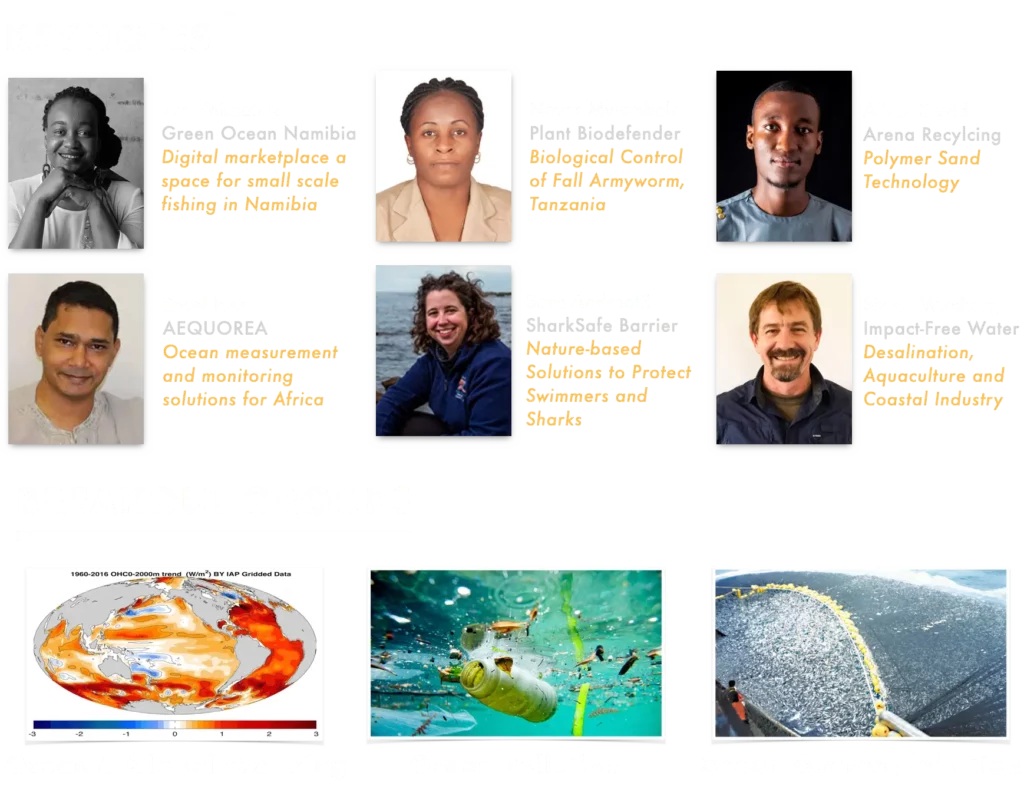
Section 5b
It is encouraging to see the amount of science and engineering innovation developing through university and research institutions. Given the great challenges of ocean health, climate disruption, coastal resiliency, sustainable energy/food/materials, and the ocean/human health nexus, how do we accelerate the final development of solutions that can be financed, scaled, and deployed for maximum positive impact? Join Session 5 to learn and be inspired. We will showcase innovators from Africa and host three discussion groups on Ocean and Global Warming, Ocean Pollution, and Ocean Overexploitation.
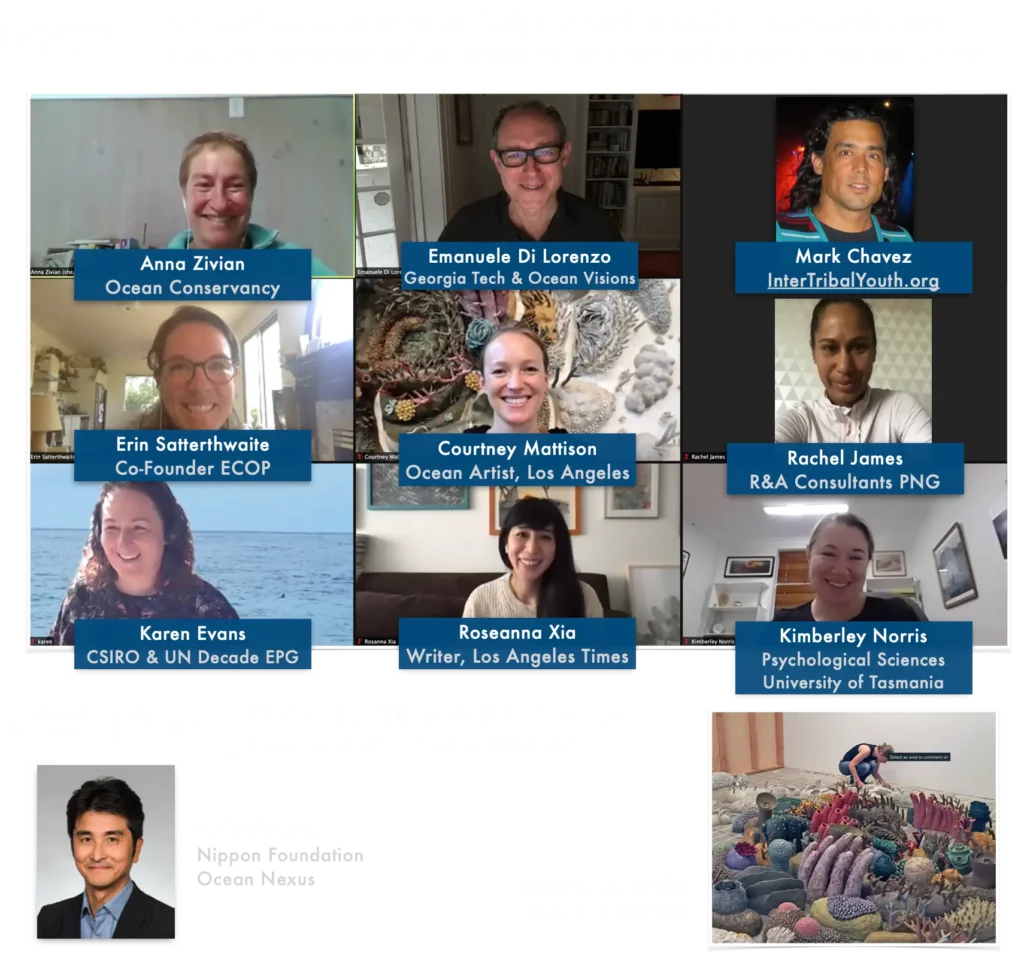
Co-chairs: Anna Zivian (Ocean Conservancy), Erin Satterthwaite (California Sea Grant & Scripps/UCSD), Karen Evans (CSIRO)
To overcome the persistent gap between research and solutions, we are establishing a Global Ecosystem for Ocean Solutions (GEOS) in support of the UN Ocean Decade. The mission of GEOS is to “establish a vibrant, global ocean solutions community of researchers, innovators, investors, decision-makers and other stakeholders to co-design and co-deploy equitable, durable, and scalable ocean-based solutions for climate change and ocean grand challenges”. The GEOS strategy for action is (1) to deploy new multi-sector processes that enable the generation and transition of scientific knowledge into co-developed ocean solutions (2) to address ocean grand challenges in climate change and the ocean that require system level (e.g. multi-sector and interdisciplinary) use-inspired research and action. This session will be devoted to the development of the implementation phase of GEOS. You can learn more about GEOS here:
Coastal Ecosystem Monitoring (Cabo Verde & South Africa Collaboration)
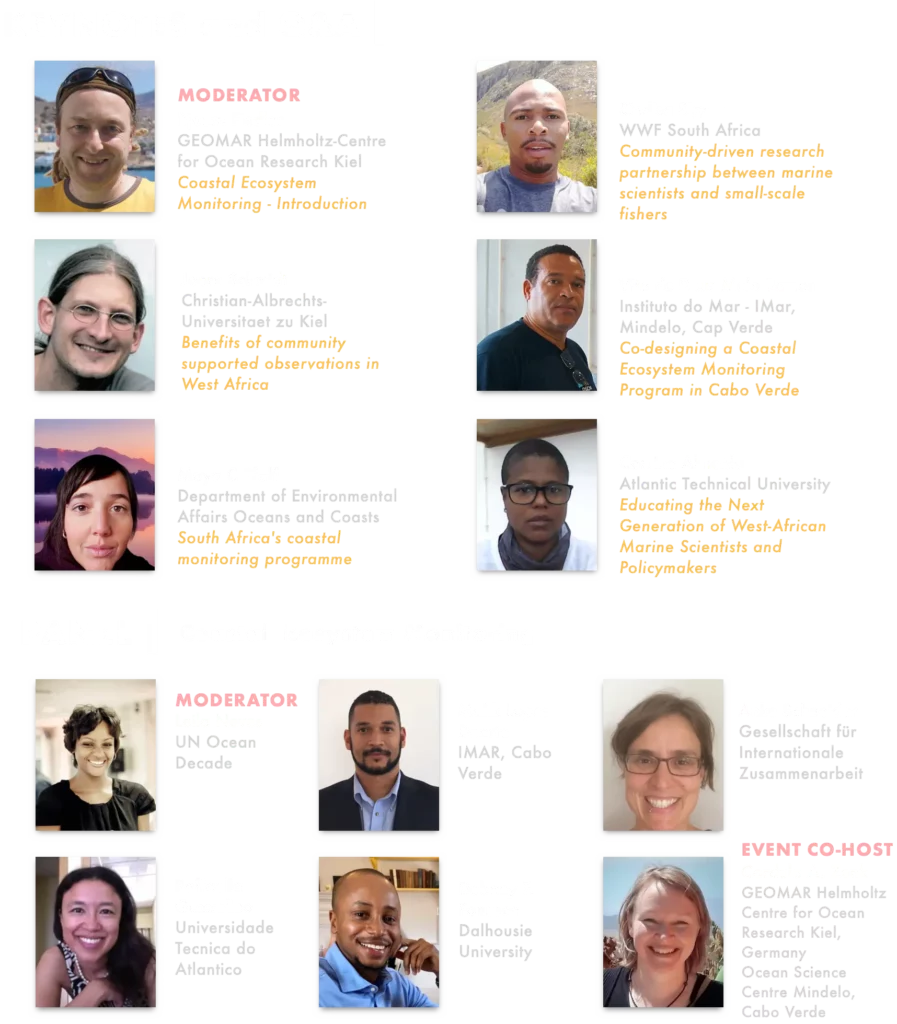
Co-organizers: Corrine Almeida (UTA), Maya Pfaff (DEA& UCT), Björn Fiedler (GEOMAR), Vito Ramos (OSCM), Cordula A. Zenk (GEOMAR Helmholtz Centre for Ocean Research Kiel, Germany & Ocean Science Centre Mindelo, Cabo Verde)
This event will bring together experts and projects that are engaged in systematic ecosystem observations in order to improve local knowledge about the marine coastal environment and the development of coastal solutions for South Africa, Cabo Verde, and similar regions. We will share experience towards establishing standards for coastal monitoring programs. How to best develop human capacities at the stakeholder level, strengthening university programs and furthering institutional capacities while improving data accessibility? What are good training schemes for coastal communities and stakeholders to improve observation capacity as well as the use of data and data projects for the benefit of different sectors. Are existing projects ready to become by co-creation methods the cornerstones for coastal ecosystem monitoring programs that can be operated by local investigators and technicians on their own and can be expanded to other regions.
Facilitating human well-being of marine communities in a conflicted world
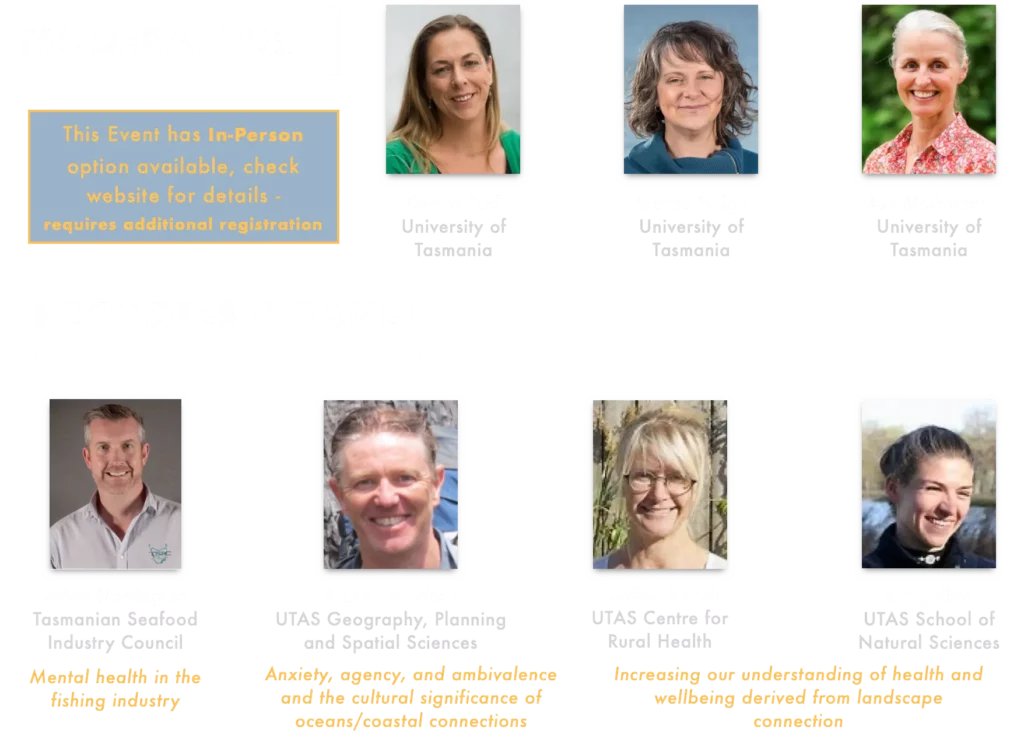
Co-organizers: Gretta Pecl (Centre for Marine Socioecology, Univ. of Tasmania), Maraa Fudge (Univ. of Tasmania)
Oceans underpin marine communities around the world, supporting cultures, fisheries, aquaculture, minerals, energy, commerce, tourism, and more. Oceans are also critical to health and well-being. This session builds of the broader Ocean Solutions summit theme of ‘Healthy Ocean-Healthy People’ to unpack what this means for the island state of Tasmania, and surrounding regions, with the goal of identifying opportunities and levers for promoting healthy ocean-healthy people in a local on-the-ground context. Through e-posters, lightning talks and Q&A panels this session aims to highlight what is needed at a local scale to facilitate and strengthen the links between ocean and human health, and help identify what actions have the greatest potential to deliver solutions.
Co-organizers: Karen Evans (CSIRO), Valeriya Komyakova (Univ. of Tasmania),
Following on from the special event introducing the Global Ecosystem for Ocean Solutions (GEOS) program, this session comprising e-posters, presentations, and discussion groups will focus on the elements needed to develop, design, and deliver solutions to ocean challenges with a focus on Tasmania. What is needed to bring ocean stakeholders including decision-makers and expert knowledge holders across research, business, industry, civil society, and community groups together to identify and develop pathways that will facilitate practical solutions towards sustainability that are applicable to the Tasmanian context? What is needed to then scale and tailor those solutions to regions beyond Tasmania?
Climate Policy for Ocean Solutions, Looking Towards COP26
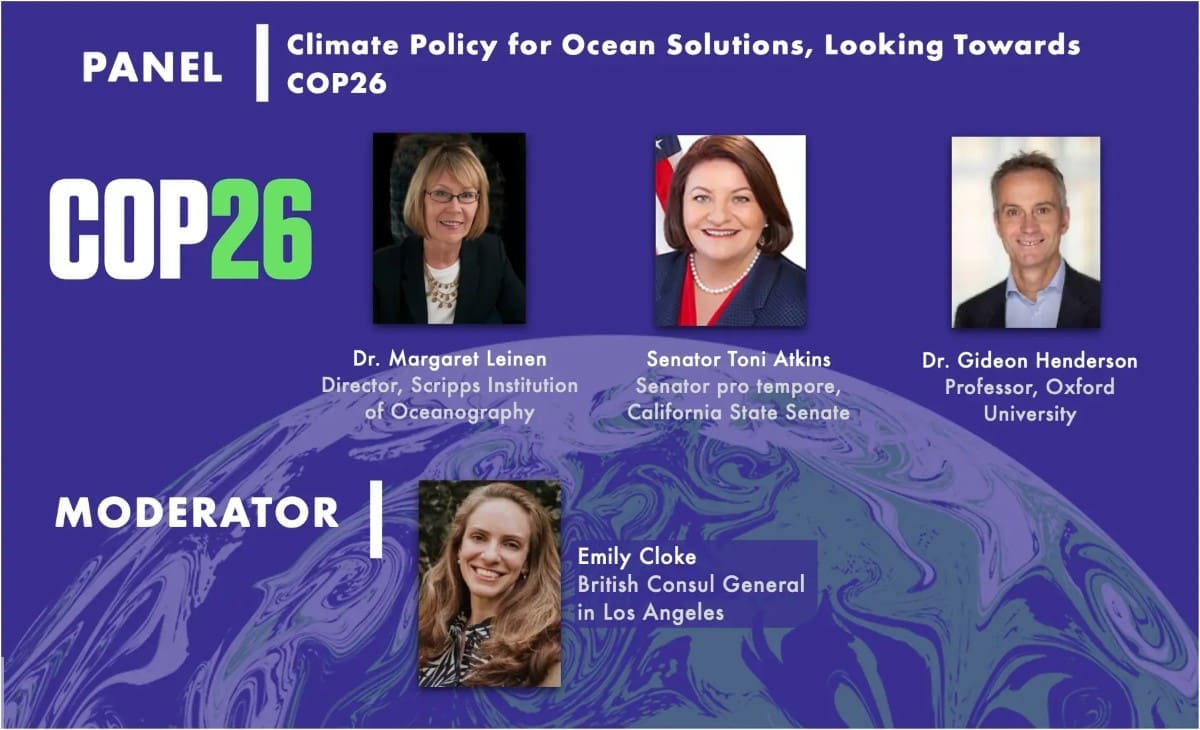
Co-Organizers: Kelly Swiech
Panelists: Dr. Margaret Leinen, California Senator pro Tem Toni Atkins, Dr. Gideon Henderson
One of the most meaningful ways we can combat climate impacts, and accelerate the implementation of ocean solutions, is through effective policy. It is critical that policy decisions be rooted in science at local, national, and international levels. Observing programs provide long-term data which allows us to understand the rate at which changes are occurring and the impacts they may have on human health, safety, ecosystems, and the overall functioning of earth systems. In this session, we will explore key contributions to ocean, earth, and atmospheric observing systems and discuss why these observations are critical to informing climate policy. In addition, we will discuss the importance of collaborations between academia and policy, and how the UNFCCC COP26 climate conference can accelerate the implementation of ocean solutions through international collaborations and policy.
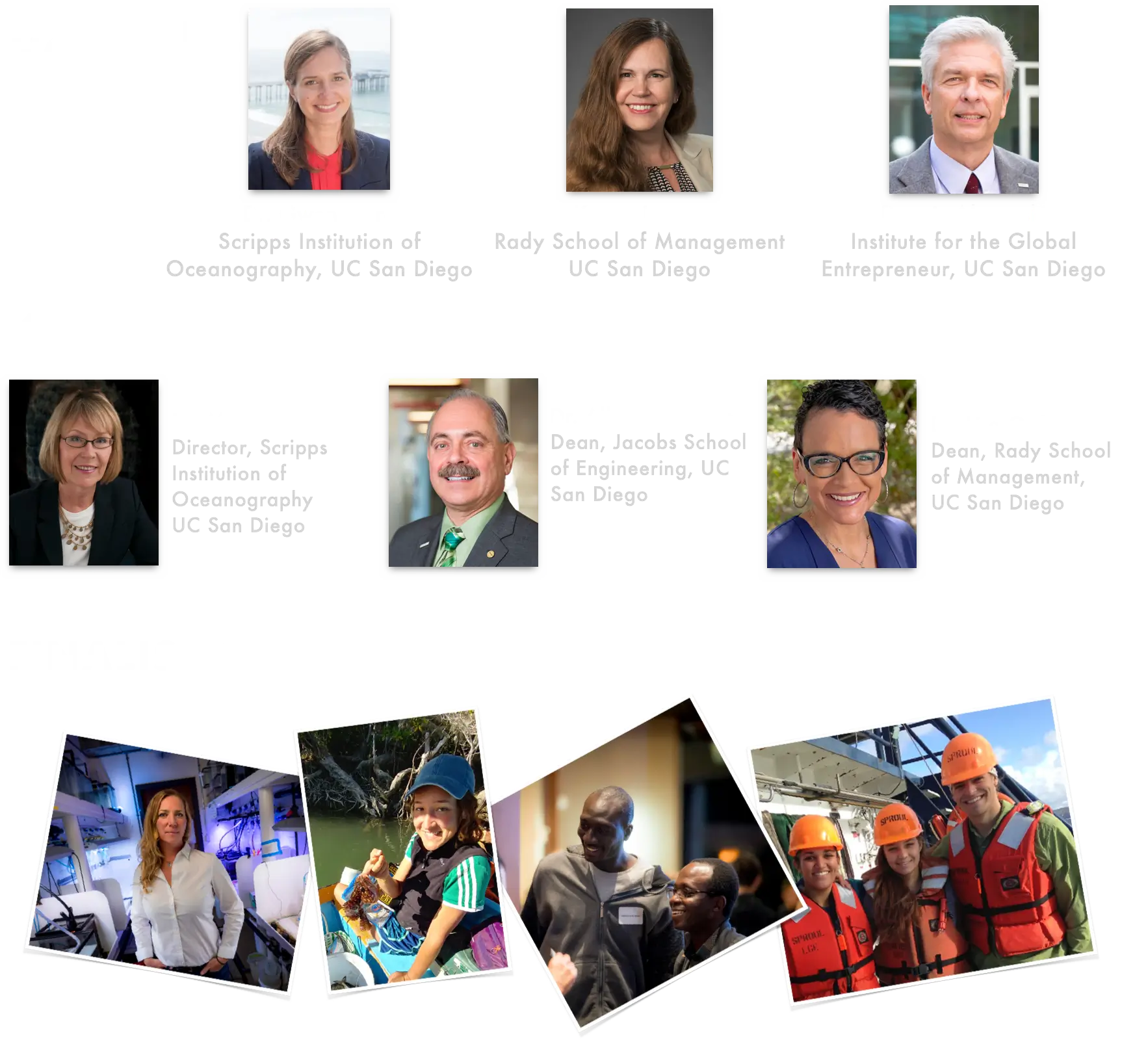
Co-organizers: Gwen Nero (Scripps), Karen Jensen (Rady School of Management), Dennis Abremski (Institute for the Global Entrepreneur)
From algal farming microbusinesses to sustainably-powered ocean buoys, student and scientist innovators compete for cash prizes before a panel of investment professionals and the public. The Triton Innovation Challenge, now in its ninth year, is a business competition focused on fostering creativity and bringing to the spotlight commercially promising, environmentally focused technologies generated by the finest minds at the University of California San Diego. Supported through the generosity of The William and Kathryn Scripps Family Foundation Inc., the program is presented through a partnership of the Rady School of Management, Scripps Institution of Oceanography, and the Jacobs School of Engineering.
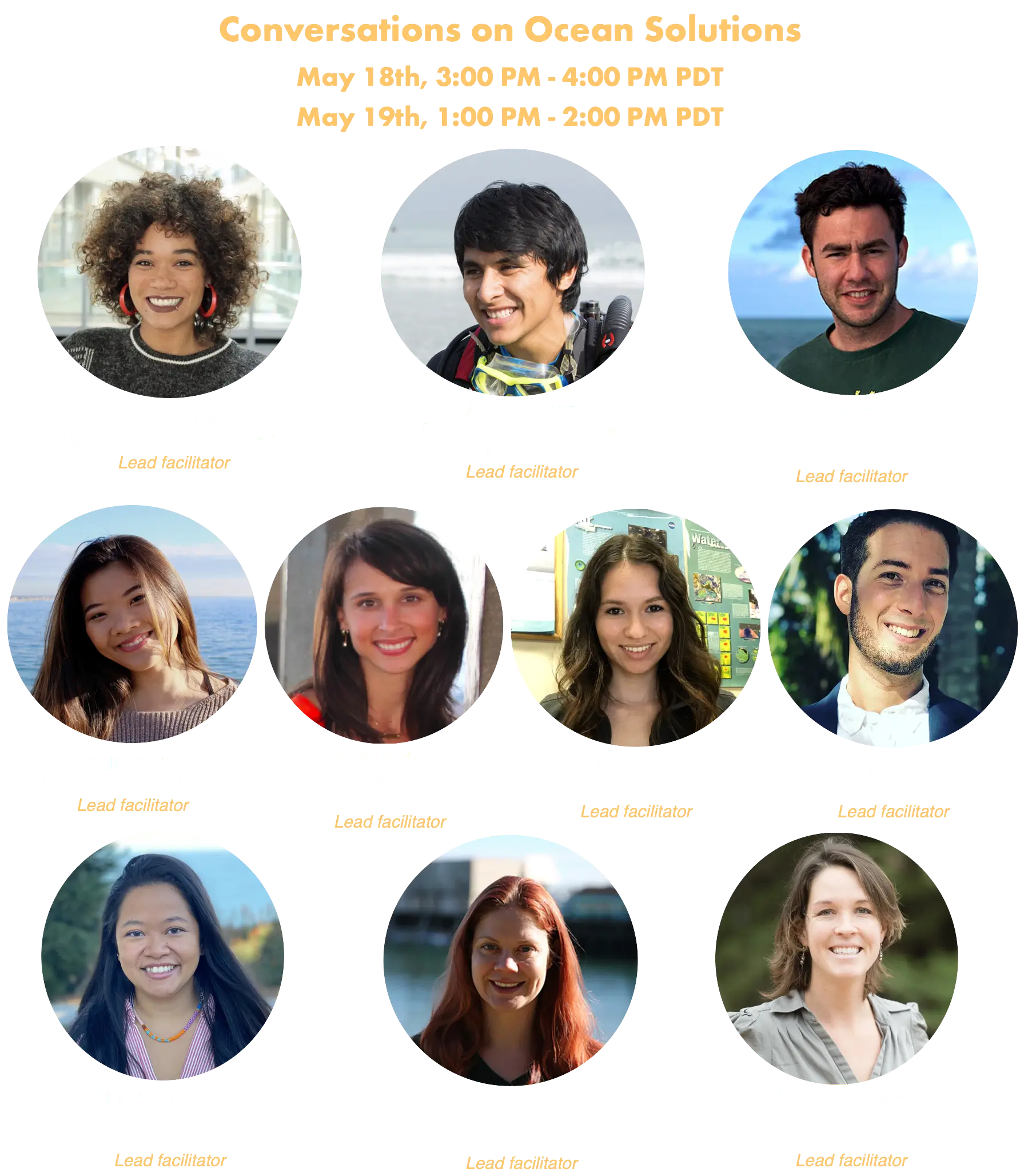
Co-organizers: Delphine Lobelle (Utrecht University), Erin Satterthwaite (California Sea Grant & Scripps/UCSD)
ECOP will host informal interactive events to share their perspectives on ocean solutions around the summit’s main sessions, as well as cross-cutting themes that emerge throughout the program. Outputs from these conversations with be posted on live e-boards that will be available and updatable during the whole summit. The goal is to enable collaboration between participants from around the globe and promote interactions in the ECOP network around ocean solutions.
